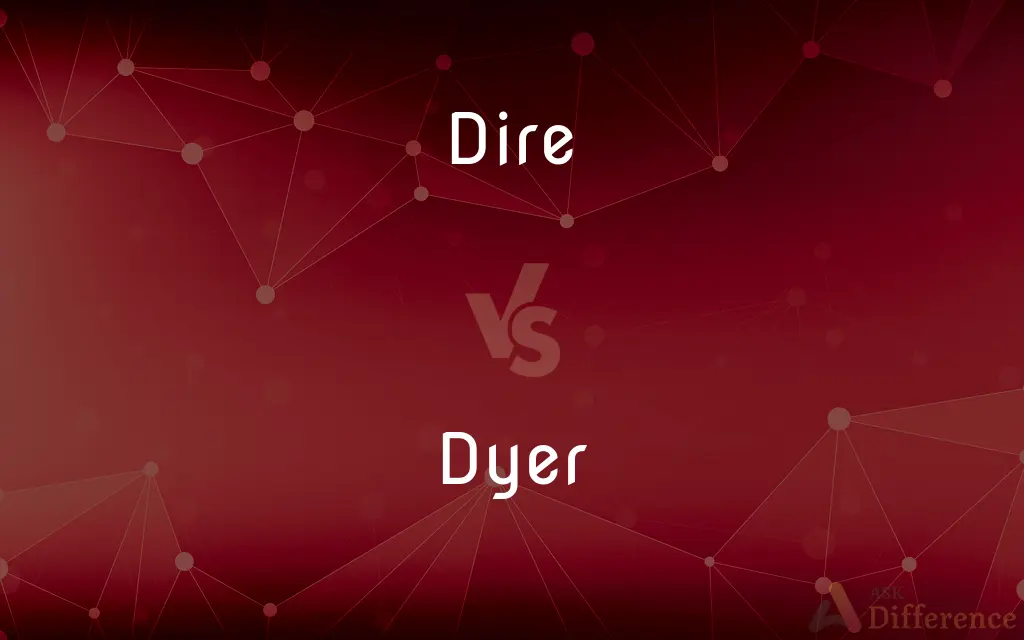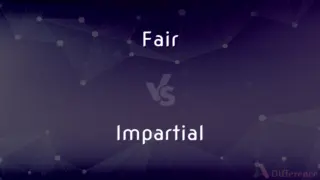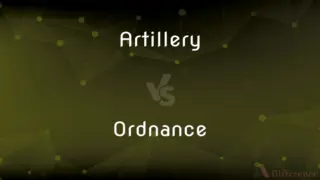Dire vs. Dyer — What's the Difference?
By Tayyaba Rehman & Urooj Arif — Updated on March 28, 2024
Dire emphasizes urgent or extreme situations, often with negative outcomes, while Dyer refers to a person specializing in dyeing materials.

Difference Between Dire and Dyer
Table of Contents
ADVERTISEMENT
Key Differences
Dire situations are often critical or extremely serious, indicating circumstances where immediate action is necessary to avoid disastrous results, whereas Dyer is a profession or role focusing on the process of changing or applying color to various materials, like fabric or hair.
Dire warnings or predictions often convey a sense of urgency and the potential for grave consequences if not heeded, highlighting the severity of the situation at hand. On the other hand, a Dyer might work with precision and creativity, applying their skills to achieve desired hues and effects on textiles or other mediums, thus changing or enhancing their appearance.
While "dire" is used to describe situations or consequences that are extremely serious and urgent, requiring immediate attention to prevent a negative outcome, Dyer represents a specific craft or occupation, emphasizing the practical and artistic application of dyes.
In literature and everyday language, "dire" is frequently utilized to add dramatic emphasis to the seriousness or urgency of a situation, implying that failure to act could result in catastrophe. Conversely, the term Dyer is often associated with industries such as textile, fashion, and beauty, reflecting a role dedicated to the application of color and enhancement of visual aesthetics.
Dire circumstances are typically associated with negative implications, underscoring the potential for significant harm or disaster if appropriate measures are not taken. In contrast, the work of a Dyer can be seen as transformative, utilizing dyes to alter or improve the visual properties of materials, contributing to the aesthetic and functional value of the end product.
ADVERTISEMENT
Comparison Chart
Definition
Describing situations of extreme seriousness or urgency.
A profession focused on applying color to materials.
Connotation
Negative, indicating severe consequences or urgency.
Neutral, associated with craft and creativity.
Context
Used in descriptions of situations or consequences.
Refers to a person or their occupation.
Associated Fields
Literature, news, and emergency communications.
Textile, fashion, and beauty industries.
Outcome/Effect
Implies a need for immediate action to avoid disaster.
Involves changing or enhancing appearance.
Compare with Definitions
Dire
Severe Conditions.
After the earthquake, the city faced dire shortages of water and food.
Dyer
Artistic Application.
The dyer used natural dyes to create a unique pattern on the scarf.
Dire
Grave Situations.
The financial analyst warned of dire consequences if the company continued its current spending trend.
Dyer
Craft Profession.
The apprentice learned various techniques from the experienced dyer.
Dire
Desperate Needs.
The stranded hiker was in dire need of rescue before the storm hit.
Dyer
Textile Coloring.
The dyer expertly matched the color of the fabric to the design specifications.
Dire
Urgent Warnings.
The environmental report described the dire effects of climate change on coastal cities.
Dyer
Material Transformation.
After the dyer's treatment, the old curtains looked brand new.
Dire
Dire Straits.
The business was in dire straits after losing its major client.
Dyer
Color Specialist.
As a skilled dyer, she was in high demand in the fashion industry.
Dire
Extremely serious or urgent
Misuse of drugs can have dire consequences
He was in dire need of help
Dyer
A person whose trade is the dyeing of cloth or other material.
Dire
Of a very poor quality
The concert was dire
Dyer
A substance used to color materials. Also called dyestuff.
Dire
Warning of or having dreadful or terrible consequences; calamitous
A dire economic forecast.
Dire threats.
Dyer
A color imparted by dyeing.
Dire
Urgent; desperate
In dire need.
Dire poverty.
Dyer
To color (a material), especially by soaking in a coloring solution.
Dire
Warning of bad consequences: ill-boding; portentous.
Dire omens
Dyer
To take on or impart color.
Dire
Requiring action to prevent bad consequences: urgent, pressing.
Dire need
Dyer
One who dyes, especially one who dyes cloth etc. as an occupation.
Dire
Expressing bad consequences: dreadful; dismal.
Dire consequences;
To be in dire straits
Dyer
One whose occupation is to dye cloth and the like.
Dire
(informal) Bad in quality, awful, terrible.
His dire mistake allowed her to checkmate him with her next move.
Dyer
Someone whose job is to dye cloth
Dire
Ill-boding; portentous; as, dire omens.
Dire
Evil in great degree; dreadful; dismal; horrible; terrible; lamentable.
Dire was the tossing, deep the groans.
Gorgons and hydras and chimeras dire.
Dire
Fraught with extreme danger; nearly hopeless;
A desperate illness
On all fronts the Allies were in a desperate situation due to lack of materiel
A dire emergency
Dire
Causing fear or dread or terror;
The awful war
An awful risk
Dire news
A career or vengeance so direful that London was shocked
The dread presence of the headmaster
Polio is no longer the dreaded disease it once was
A dreadful storm
A fearful howling
Horrendous explosions shook the city
A terrible curse
Common Curiosities
What does "dire" mean?
Dire describes extremely serious or urgent situations with potentially disastrous outcomes.
Can "dire" be used to describe positive situations?
No, "dire" is specifically used to describe negative and urgent situations.
Do Dyers only work with textiles?
Primarily, yes, but Dyers can also work with other materials that require coloration, including hair in the beauty industry.
Is being a Dyer an artistic profession?
Yes, dyeing often involves a great deal of creativity and artistic skill, especially when working with patterns and custom colors.
What skills are important for a Dyer?
Important skills include knowledge of fabrics, color theory, chemical processes, and creativity.
Who is a Dyer?
A Dyer is a person who specializes in dyeing materials, such as fabric or hair, often working within the textile, fashion, or beauty industries.
How do you know if a situation is dire?
A situation is considered dire if it poses severe consequences or requires immediate action to prevent a negative outcome.
Can "dire" refer to financial situations?
Yes, "dire" can describe severe financial straits that threaten stability or survival.
What makes a good Dyer?
A good Dyer has a deep understanding of color, meticulous attention to detail, and the ability to consistently produce the desired outcome.
Can technology affect the work of a Dyer?
Yes, advancements in dyeing technology can enhance the precision, efficiency, and range of colors and effects a Dyer can achieve.
How can someone become a Dyer?
Becoming a Dyer typically involves formal education in textile sciences or related fields, along with hands-on experience in dyeing techniques.
Is the term "dire" subjective?
The perception of what is considered "dire" can vary based on personal or cultural views, but it generally denotes clear and severe urgency or danger.
What is the historical significance of Dyers?
Historically, Dyers played a crucial role in the development of trade and fashion, with certain colors and dyes signifying status and wealth.
Can "dire" situations be prevented?
While not all dire situations can be prevented, many can be mitigated with foresight, planning, and immediate action.
What are the environmental concerns associated with dyeing?
The dyeing process can involve harmful chemicals and significant water usage, raising concerns about pollution and resource depletion.
Share Your Discovery

Previous Comparison
Fair vs. Impartial
Next Comparison
Artillery vs. OrdnanceAuthor Spotlight
Written by
Tayyaba RehmanTayyaba Rehman is a distinguished writer, currently serving as a primary contributor to askdifference.com. As a researcher in semantics and etymology, Tayyaba's passion for the complexity of languages and their distinctions has found a perfect home on the platform. Tayyaba delves into the intricacies of language, distinguishing between commonly confused words and phrases, thereby providing clarity for readers worldwide.
Co-written by
Urooj ArifUrooj is a skilled content writer at Ask Difference, known for her exceptional ability to simplify complex topics into engaging and informative content. With a passion for research and a flair for clear, concise writing, she consistently delivers articles that resonate with our diverse audience.















































